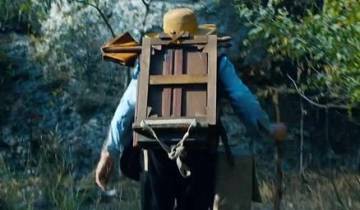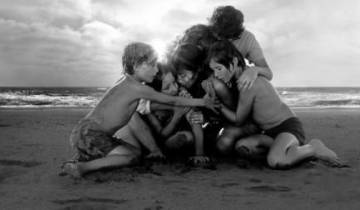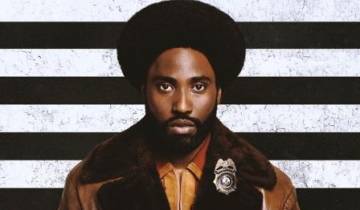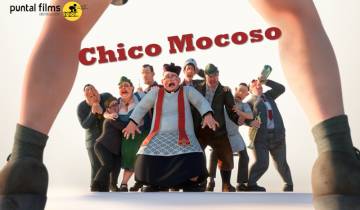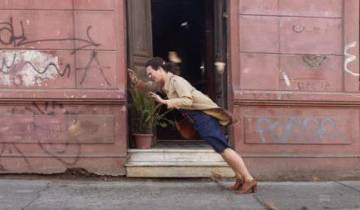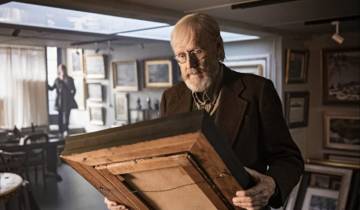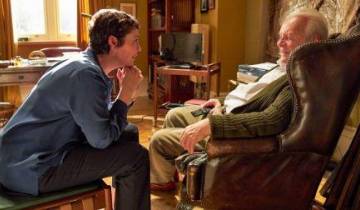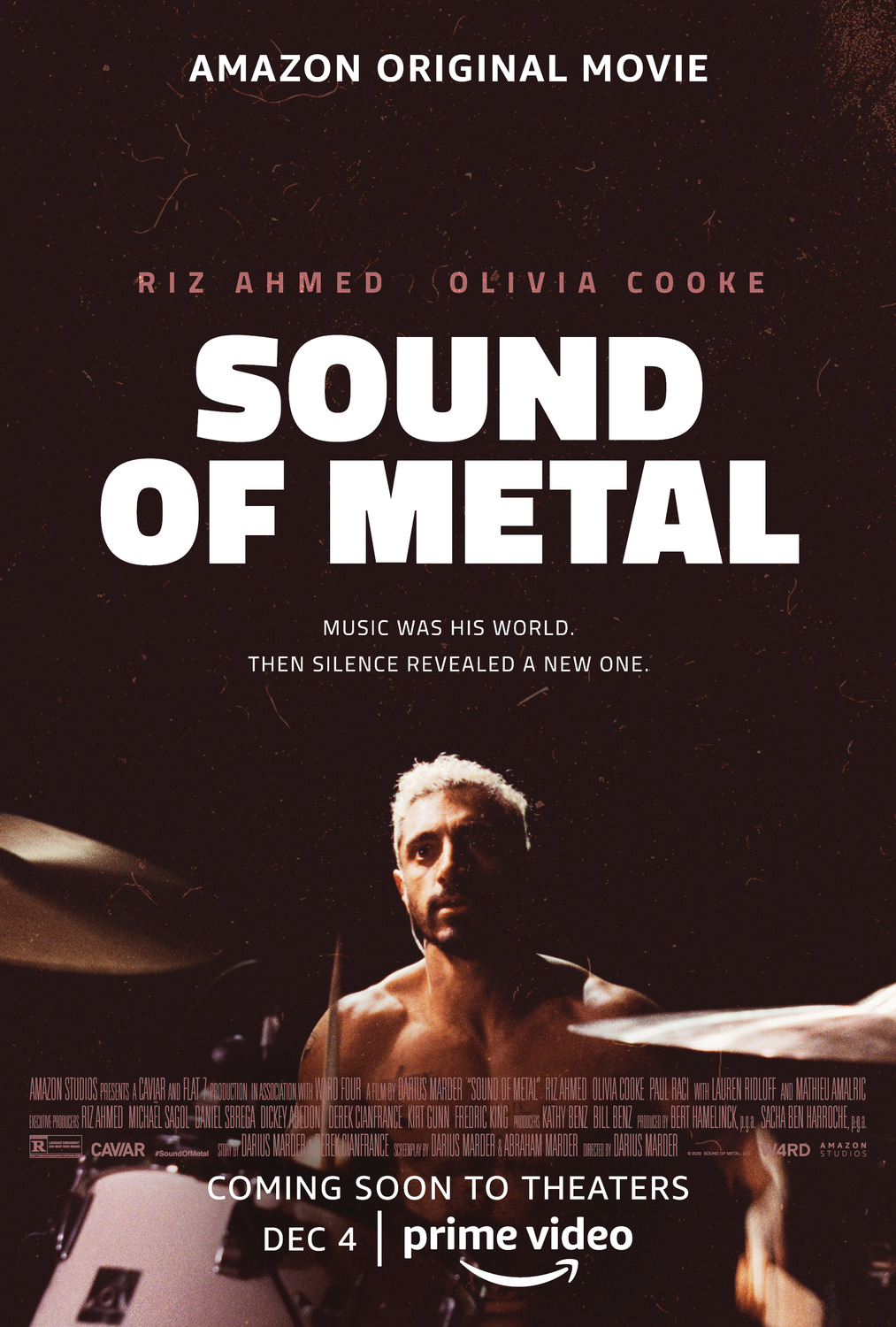
Sound of silence
Original title: Sound of Metal
Direction: Darius Marder
Country and Year: United States, 2019
Duration: 120 min

By Adriana Schmorak Leijnse
The Sound of Metal is a 2019 American drama film directed and co-written by Darius Marder and starring Riz Ahmed (Ruben Stone), Olivia Cooke (Lou), Paul Raci (Joe), Lauren Ridloff ( Diane), Mathieu Amalric (Richard Berger) and Chealsea Lee (Jenn). It tells the story of a heavy metal drummer who progressively loses his hearing.
The film premiered at the Toronto International Film Festival on September 6, 2019. It received six nominations for the Oscars 2021 and managed to win two: for best editing and best sound.
Synopsis:
Ruben Stone (Riz Ahmed) is a drummer for the heavy metal duo Blackgammon, along with his girlfriend and singer, Lou (Olivia Cooke). They live in an RV while performing concerts throughout the United States.
Rubén discovers that he is losing his hearing and consults with a doctor for a diagnosis. The doctor discovers that Rubén can only distinguish between 20 and 30 percent of the words he hears and his hearing will deteriorate rapidly; Also, although cochlear implants may benefit you, their high cost is not covered by insurance. The doctor suggests that Rubén eliminate all exposure to loud noise and then undergo further testing, but Rubén ignores it. Also, the drummer is a recovering drug addict. Lou learns of Ruben's condition and wants to stop acting for his safety, but he wants to continue. Lou finds a rural shelter for recovering deaf addicts that accepts Ruben, run by a man named Joe (Paul Raci), a recovering alcoholic who lost his hearing in the Vietnam War.
Ruben begins to meet the other members of the shelter while attending meetings and settling into his new life. In class Diane begins to learn sign language. Joe asks Ruben to write endlessly, in an effort to make him comfortable with silence, and confides that he himself will do the same simultaneously. Ruben begins to connect with the children and the rest of the community. He gives the children and Diane basic drumming lessons.
So far, Rubén's stay has been sponsored by a church. Joe offers her a more permanent way to stay, as a community employee, and tells her to think about it. But he doesn't want to stay, so he gets his friend Jenn (Chelsea Lee) to sell her drums and other music equipment, then sells his trailer and uses the money for cochlear implant surgery. Ruben asks Joe to loan him money to buy back his caravan, while he waits for the implant to be activated. Joe refuses, commenting that Ruben looks and sounds like an addict. Heartbroken, Joe asks Ruben to leave the community, as it is based on the belief that deafness is not a disability, it is not something to be repaired.
The implants allow Ruben to hear, but the sound from them is severely distorted and this interrupts his attempts to regain his old way of life. Ruben flies to meet Lou at the home of his wealthy father, Richard (Mathieu Amalric), in Paris, and Ruben there discovers that his implants do not allow him to listen to music as he used to. The next morning, Ruben takes his things and leaves while Lou is still sleeping. Annoyed once again by the distortion, he sits on a bench and removes the processors from his implants, feeling comfortable with the silence.
The director and his sources:
Director Darius Marder grew up in Conway, Massachusetts with his parents and four siblings. His parents, Lauri and Efrem Marder, both New York artists, lived by the teachings of the Russian philosopher and mystic George Gurdjieff. George Gurdjieff was born at the end of the XNUMXth century in the Armenia of the then Russian Empire, his main work was to make known and transmit the teachings of the fourth way in the western world. A mysterious and charismatic personality, with a keen critical sense, and a high traditional culture, captured the attention of many, guiding them towards a possible spiritual and humanitarian evolution.
Darius's family lived in Conway with about 35 Gurdjieff followers, which Marder has described as a "beautiful experience." The doctrine of the fourth way originates from various traditions (Buddhism, Sufism, Hinduism, Eastern Orthodox Christianity), theosophy and Russian Freemasonry of the XNUMXth century. His philosophy ensures that there are three paths: the path of the fakir, that of the monk, and that of the Yogi. Beyond these three paths, there is a fourth or fourth path, a metaphysical, cosmological and philosophical doctrine, idealistically oriented.
The fourth way is based on the belief that the human being needs a procedure or system to awaken (through self-knowledge, conscious attention to the environment, and especially "self-remembering"). Within this doctrine three other paths are recognized, but they are not practical within the current way of life. As the schools of the fourth way indicate today, there is a type of way for each type of person and the meaning is to find the forgotten part of themselves; In short, awakening from the dream, from the so-called waking consciousness in which one is immersed, which is nothing more than another form of sleep.
The fourth way requires the person to work on the intellect, the emotions, and the physical body. In addition to the Gurdjieff doctrines, Darius drew from other sources, for example, from the knowledge of his great-grandfather, who grew up in an Orthodox Jewish community in Austria and above all, Darius was particularly close to his paternal grandmother, Dorothy Marder, who after taking an antibiotic for a bout of pancreatitis, she was profoundly deaf. His sudden deafness had a significant impact on Darius. From all these sources the director took ideas for his film.
Film analysis:
The sound of metal refers to the sound of the drums at the beginning of the film, while towards the end it refers to the metallic sound of church bells, the last sound the drummer hears before removing the headphones. The title refers to these two metallic sounds. The noise of machines, of the train, of industrialization, the noise of the modern and contemporary era is characterized by metallic sound. Today's society is alienated.
Rubén and Lou were rejected by their families and for that reason they discharge that fury and that frustration in the music, which is nothing more than beating the drums with fury and shouting words against the world into the microphone. That alternative music and the rejection of their families keep them together. But not love, or maybe yes? Later we will see that Ruben wants to continue the relationship, but Lou is no longer interested.
The drummer becomes deaf, losing 75% of his hearing. Rubén is received in a religious center that teaches people with hearing loss, sign language. It is a center that receives help from the Church, and Joe, its director, is a man of Christian faith. There Rubén had obtained a place of belonging. What binds these people is not hatred and frustration, but love and acceptance of God despite their regrets. They learn to see life not as an accumulation of misfortunes but as the opportunity to learn to "listen" to silence. "Did you ever have a minute of peace within yourself?" Joe asks Rubén.
But Rubén does not want to accept his current situation. To regain that hearing ability, he makes an appointment with a specialist to perform cochlear surgery, knowing that he would be dependent, for life, on a state-of-the-art hearing aid, which connects the ear directly with the brain cells. It is a device that tricks the brain into believing that the ear works. The problem for Rubén was that that sound came to him in the form of a horrible metallic rumbling, like that of the drums once played by him. Everyone suddenly began to hear choppy and mechanical.
A bit like the Bergman Silence of God, where God does not communicate through the churches and parish priests but directly with each one of us, through the elements of nature, through love. Although the answer to our prayers and prayers is not heard in words, their presence is felt. In “The Communicants” or “Winter Light” (Ingmar Bergman, 1962), and in the words of Raquel Wasserman in her book Bergman Filmology, a Lutheran parish priest goes through a crisis of faith and unloads on his acolytes his own overwhelming and obsessive doubts about whether God really exists or is an invention of men to give meaning to their lives. “The priest disbelieves in his mission of evangelical faith. He questions it because it is dedicated to a silent God and therefore unknown ... ”.
But Father Tomás finds the answer: towards the end “he proclaims: _because everything is God ... the sunlight, the birds, the flowers! In all nature, everywhere is God! ”. For the Jewish-Dutch philosopher Baruj Spinoza, admired by Bergman, “the attributes of God are infinite, since God himself is (...) Nature in all its manifestations, they are manifestations of the existence of God. By opening ourselves with love to everything and everyone, we are loving God. ”(1)
Despite his obvious advances, the drummer cannot resign himself to his fate. He does not believe in God or in destiny, he no longer believes in his fellow men. He just wants to recover his past life, with a strong attachment to known people and material things, that's why Joe tells him: "for us deafness is not a problem that we have to solve" and "you behave like an addict." Seeing that the drummer could not appreciate the love and dedication received on campus, nor give up his past life, he expels him and forbids him to return (it almost seems like a scene from the Old Testament, taken from Genesis, when God expels Adam and Eva from paradise).
The drummer did not understand the deep and mysterious meaning of his deafness. So he decides to believe in science, in the positivism of a logical world, but without mysticism, he operates and the only thing he can hear as a result of the surgery are metallic sounds. As if this were not enough, he loses his girlfriend (his lifelong love) and can no longer return to the center for the hearing impaired where he had been taught sign language (as well as education, friendship, a sense of community) .
And this is how we all live, the director tells us through sound and image. We live in a logical world, ruled by science, but in reality we are deaf to the sounds of nature and the silence of a pantheistic god, who speaks to us through silence.
This is where the fourth path of Gurdjief comes in, a path that the individual has to seek for himself and that is only for him. There is no doctrine about what is right or not to do, feel or think in life, but that this is an arduous, difficult, but unique path for each individual. Joe found his way by founding a center for the hearing impaired, helping others based on the Christian faith. Lou found his way by reconciling with his father and radically changing his music (the duet that sings with his father has nothing to do with the desperate screams of their performances in the United States). Rubén stripped himself of all his property to pay for his surgery, lost his place in the hard of hearing community and lost his girlfriend.
Even the surgery he had hoped for didn't work out. Finally, he sits down on a bench in a plaza, he stays for a few minutes with his eyes fixed on a church, whose bells emit an unbearably metallic sound for him, he takes off his hearing aid and finally the long-awaited silence arrives. Look at the setting sun, the sun seems to communicate with it in some way that we neither hear nor understand. The setting sun, one of the gods of antiquity, especially in the religion of the ancient Egyptians, gave way to the dark and cold night, which is the death of the day.
In Rubén's arduous journey, the church does not give him the answer he needs; on a bench in a plaza, looking at the setting sun, in total silence, he finds the place where he can feel inner peace for a moment. The sun star awakens in him an internal connection, a voice resounds without the need to "listen" in its functional and physical sense. The image is cut off before the sun crosses the horizon line. The end is open.
Perhaps it is that, as Spinoza said, God is in everything, in Nature, and is not found in a church built by men. How the words of Spinoza, taken up by Bergman, resonate in that gaze of the drummer at the sun, source of light and heat essential for existence, his ears then immersed in the most absolute silence. He finally manages to experience that minute of peace that Joe, the campus principal, was talking about.
It is worth noting the masterful work of the sound director, since in several sections of the film we hear the sounds, noises and silences that only the protagonist hears. This is called "inner sound", because it is only heard by him in that way, even when the source is external. Diegetic and extradiegetic sounds (those that do or do not belong to the plot) are the most common in most classic cinema. But what prevails in this film are the internal and subjective sounds (and silences). This is very important because no matter where the source comes from, the important thing is that, just as everyone follows their own path to achieve their goals, each ear hears a different sound or noise, although at first it seems the same to everyone. .
Notes:
-1 Wasserman, Raquel. Bergman filmology. Editorial Fraterna. Bs As, 1988, pp. 71-72
BIBLIOGRAPHY:
Wasserman, Raquel. Bergman filmology. Editorial Fraterna. Bs As, 1988
Darius Marder - Wikipedia https://en.wikipedia.org/wiki/Darius_Marder
George Gurdjieff- Wikipedia, the free encyclopedia
Sound | Film analysis (uji.es)
CINEMA AND PSYCHOLOGY: THE SILENCE (Tystnaden, Ingmar Bergman, 1963): The archetype of the animus. Eros and Logos. (cineypsychology.com)
The Audiovision (wordpress.com)
